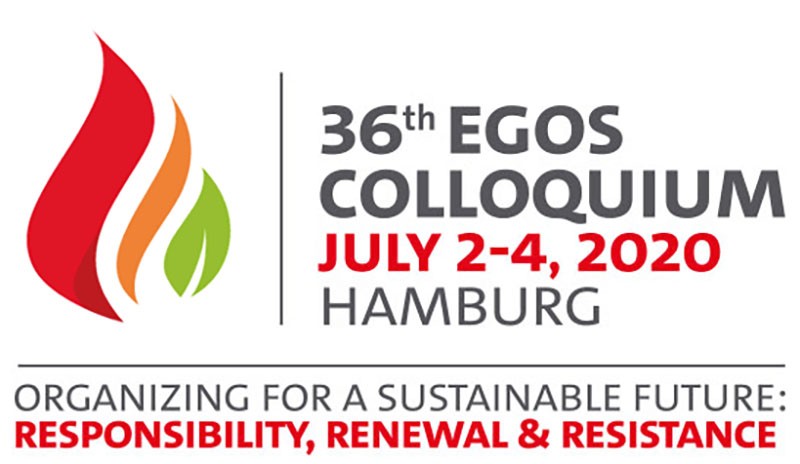PDW 03: Digital Media, Communication, and Organization [or: Digital Media Eats Organization for Breakfast]
Call for Applications
Facilitators:
Cristina Alaimo, University of Surrey, United Kingdom
Nicolas Bencherki, TÉLUQ Montréal, Canada
Nanna
Bonde Thylstrup, Copenhagen Business School, Denmark
Boukje Cnossen, Leuphana
University of Lüneburg, Germany
François Cooren, Université de Montréal, Canada
Leonhard Dobusch, University of Innsbruck, Austria
Ann-Christina
Lange, Innovation Centre Denmark, Tel Aviv, Israel, Copenhagen Business School, Denmark
Attila
Marton, Copenhagen Business School, Denmark
Aleksandra Przegalińska,
Kozminski University, Poland
Helene Ratner, Aarhus University, Denmark
Ned
Rossiter, University of Western Sydney, Australia
This pre-Colloquium Development Workshop (PDW) aims to bring together scholarship from two thriving communities at EGOS: Standing Working Group (SWG) 05 on “Organization as Communication” and SWG 11 on “Digital Technology, Media and Organization”. Both communities are in varying ways concerned with the organizing function of media, including inquiries on how media and other materialities and technologies shape and constitute forms of organization and organizing.
- On the one hand, in the “Organization as Communication” tradition, the focus especially lies on how media and materialities partake in and shape the process of communication (understood here as complex and dynamic processes of meaning negotiation and transformation; see also Cooren, 2015). Importantly, in this view, such communication is “axial - and not peripheral” to the existence of organization and organizing (Ashcraft, Kuhn & Cooren, 2009, p. 22).
- On the other hand – but in a similar vein – the “Digital Technology, Media and Organization” community draws on a broad understanding of media as a concept, by looking at how economic, social, and cultural life becomes mediated through technologies and tools of various kinds (incl. calendars, dashboards, or elevators; see Beyes, Holt & Pias, 2019). Also here, scholars center on technological mediation as a fundamental condition of organizing – and on how mediating objects of various kinds tend to shape (or even constitute) practices of organizing.
The nexus between technological mediation, communication,
and organization, in turn, has been strongly affected by the rise of digital media, with digital media “actualizing” the “intimate
relation of media and organization” as they “perhaps exacerbate its potentials and conflicts” (Beyes et al., 2019, pp. ix–x).
These technologies have led to the emergence of new practices of organizing and controlling work and data, such as algorithmic
management, etc. (see Beverungen et al., 2019; Flyverbom, 2019; Mumby & Plotnikof, 2019). Furthermore, these technologies
have enabled the emergence of more loose and fluid organizational forms that can resemble social movements (see Schoeneborn
et al., 2019) and potentially saturate all spheres of social and organizational life in more or less intended ways – for instance,
hacktivist collectives (Dobusch & Schoeneborn, 2015) or other new forms of “connective action” (Bennett & Segerberg,
2012).
In this PDW, we invite a broad range of work-in-progress papers (empirical, conceptual, or essayistic)
that explore the nexus between technological mediation, communication, and organization – and that shed new light on the restraining,
liberating and other surprising capacities of digital media technologies in organizational contexts.
Format
The
PDW will include a panel discussion with eminent and up-and-coming scholars from both communities (SWGs 05 & 11). The
panel will reflect on and discuss how the relation between technological mediation, communication, and organization is changing
(or is beginning to and is not at all) through the rise of digital media. One important purpose of the panel is to clarify
key theoretical concepts in use at the two scholarly communities as well as to explore potentials of a joint vocabulary.
After the panel discussion, the work-in-progress papers submitted by the workshop participants will be in focus
in roundtable discussions. Our ambition is that each paper will receive feedback from two expert facilitators, one each from
the two scholarly communities involved (to broaden the range of perspectives and to enable dialogue across communities).
The workshop will conclude with a final discussion and wrap-up.
Application
To be considered for this PDW, you have to submit a short paper. The workshop is suited for scholars (of various experience levels) with research ideas under development. Please submit – via the EGOS website – by May 15, 2020 (extended deadline) a single document of application (.doc, .docx or .pdf file) that includes the following information:
On the first page: a cover page including author name(s), affiliation(s), and email address(es)
A draft/work-in-progress paper (max. 10 pages, incl. references, figures, or tables)
References
- Ashcraft, K.L., Kuhn, T.R., & Cooren, F. (2009): “Constitutional amendments: ‘Materializing’ organizational communication.” Academy of Management Annals, 3 (1), 1–64.
- Bennett, W.L., & Segerberg, A. (2012): “The logic of connective action: Digital media and the personalization of contentious politics.” Information, Communication & Society, 15 (5), 739–768.
- Beverungen, A., Beyes, T., & Conrad, L. (2019): “The organizational powers of (digital) media.” Organization, 26 (5), 621–635.
- Beyes, T., Holt, R., & Pias, C. (eds.) (2019): The Oxford Handbook of Media, Technology, and Organization Studies. Oxford, UK: Oxford University Press.
- Beyes, T., Conrad, L., Lovink, G., Martin, R., & Rossiter, N. (2019): Organize. In Search of Media. Minneapolis: University of Minnesota Press & meson press.
- Cooren, F. (2015): “In medias res: Communication, existence, and materiality.” Communication Research and Practice, 1 (4), 307–321.
- Dobusch, L., & Schoeneborn, D. (2015): “Fluidity, identity, and organizationality: The communicative constitution of anonymous.” Journal of Management Studies, 52 (8), 1005–1035.
- Flyverbom, M. (2019): The Digital Prism. Cambridge: Cambridge University Press.
- Mumby, D., & Plotnikof, M. (2019): “Organizing Power and Resistance: From Cohersion, to Consent, to Governmentality.” In: J. McDonald & R. Mitra (eds.): Movements in Organizational Communication Research: Current Issues and Future Directions. New York: Routledge.
- Schoeneborn, D., Kuhn, T.R., & Kärreman, D. (2019): “The communicative constitution of organization, organizing, and organizationality.” Organization Studies, 40 (4), 475–496.


